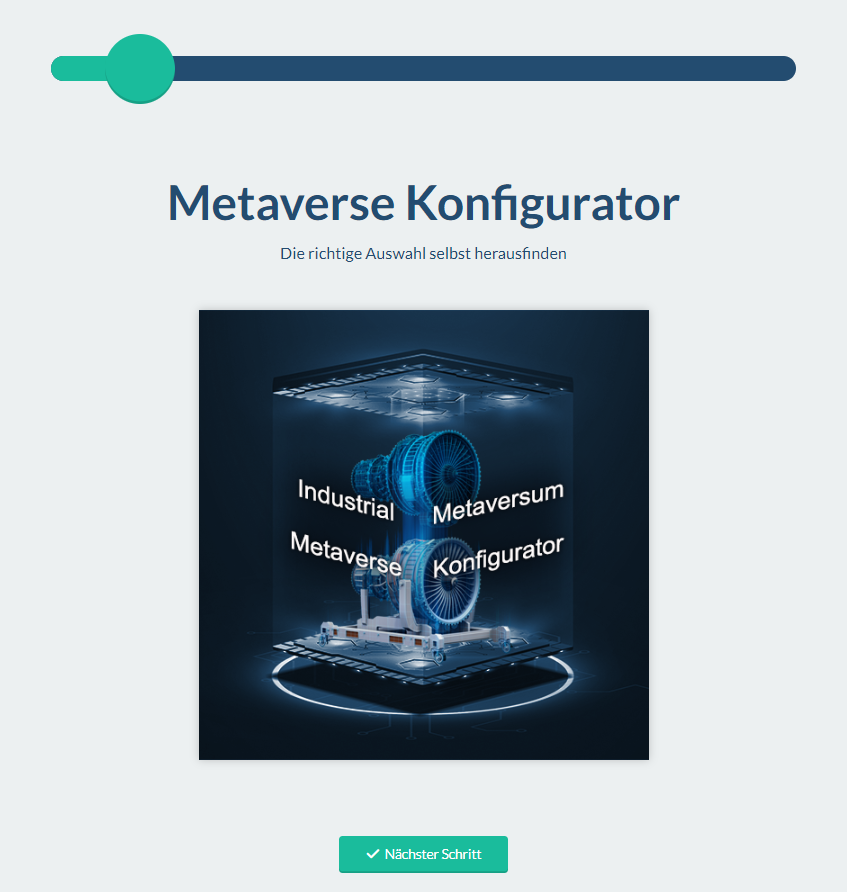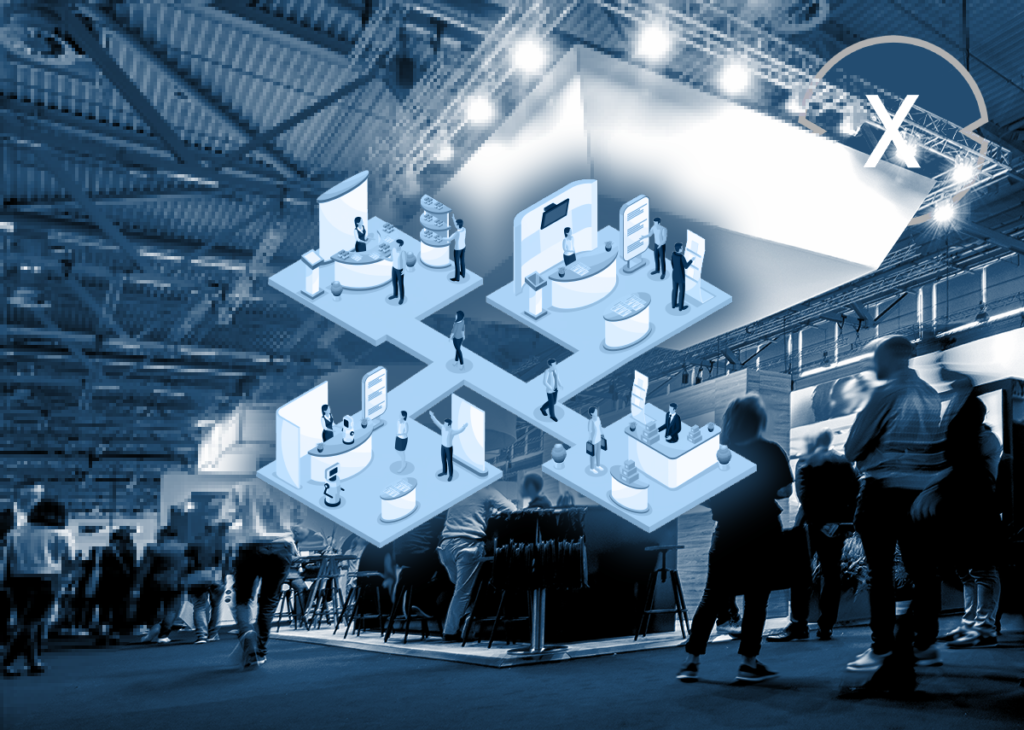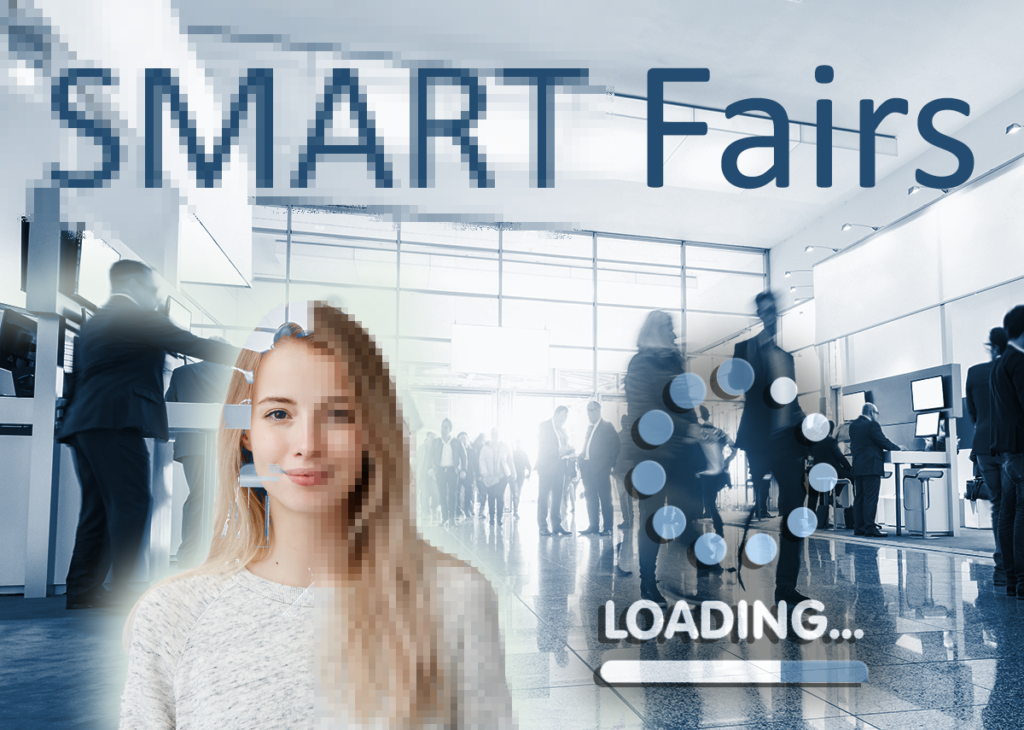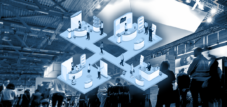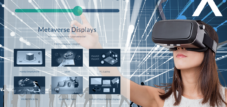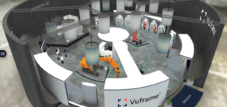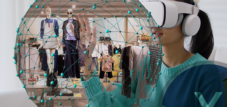Hybrid trade fair with metaverse and physical trade fair, in-house exhibition or event – suitable for global, cross-border events
Language selection 📢
Published on: July 25, 2023 / update from: December 3, 2024 - Author: Konrad Wolfenstein
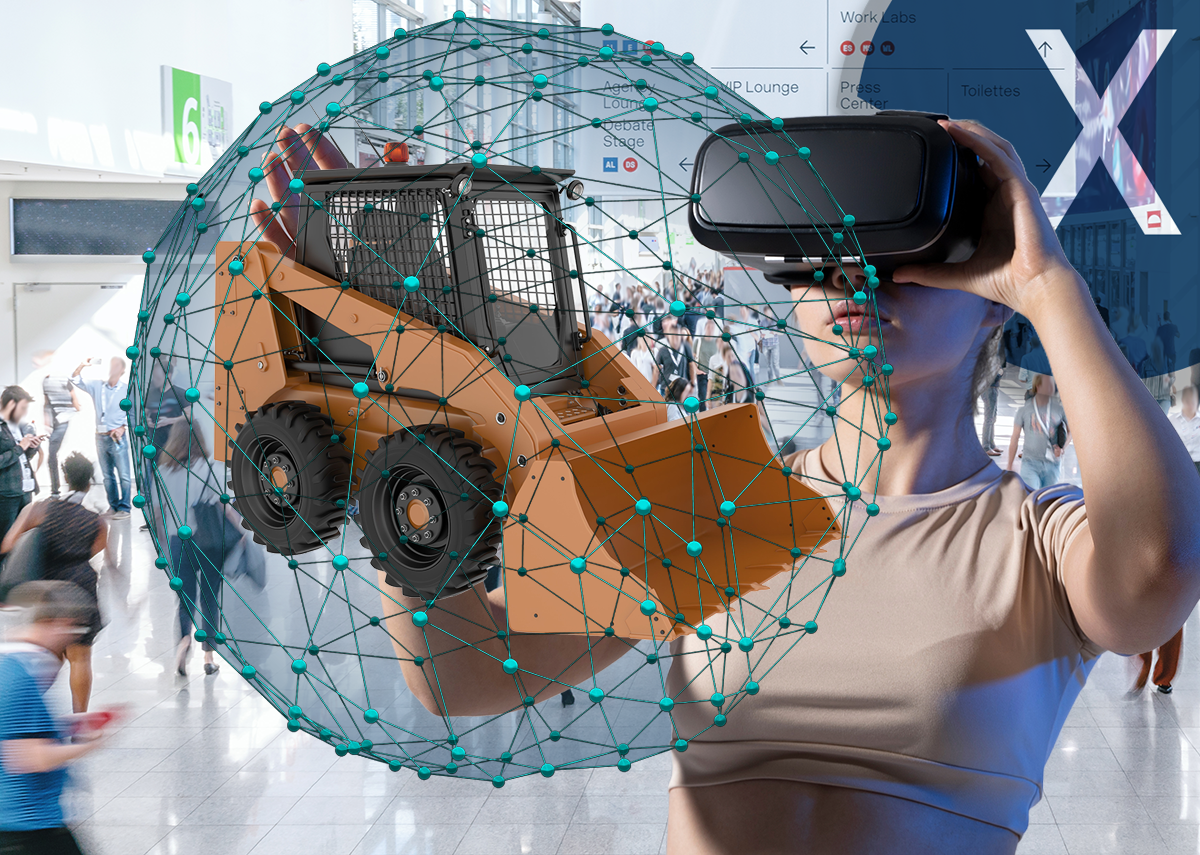
Hybrid trade fair with metaverse and physical trade fair, in-house exhibition or event – Image: Xpert.Digital
Hybrid trade fairs with and in the Metaverse: 3D product presentations are revolutionizing global events
The advantages of 3D product presentations in the Metaverse in combination with physical trade fairs and events, also used as a hybrid trade fair, are diverse and can help companies strengthen their presence in the market and create an impressive customer experience.
1. Expanded reach and global participation
By integrating 3D product presentations in the Metaverse, companies can digitally expand their physical trade fairs and events. This allows them to reach a global audience that cannot be physically there. Attendees from all over the world can take part in the trade fair virtually and interact with the products, resulting in increased reach and brand awareness.
2. Cost effectiveness
Hosting physical trade shows can involve significant costs, including booth rental fees, travel and accommodation costs for employees, and logistics. By integrating 3D product presentations into the Metaverse, companies can reduce these costs while still providing an impressive trade show experience. Virtual exhibition stands can be created and customized cost-effectively without the need to transport physical products.
3. Interactive product presentations
In the Metaverse, products can be presented three-dimensionally and interactively. Visitors can view the products from all sides, zoom, rotate and see them in action. This immersive experience allows customers to develop a better understanding of the products and make informed purchasing decisions.
4. Real-time feedback and data analysis
While physical trade shows often make it difficult to capture accurate data about visitor behavior, 3D product presentations in the metaverse provide detailed insights. Companies can track visitor behavior in real time, see which products are attracting the most attention, and collect valuable feedback. This data can be used for future marketing and sales strategies.
5. Time flexibility and longer availability
While physical trade fairs usually only take place on one or a few days, 3D product presentations in the Metaverse can be made available over a longer period of time. Customers have the flexibility to explore the exhibition stands and products at different times, increasing the chances of interaction and conversion rates.
6. Creative design options
There are hardly any limits to creativity in the Metaverse. Companies can create virtual exhibition stands that are unique and impressive, with animations, special effects and interactive elements. This allows you to stand out from competitors and offer an unforgettable trade fair experience.
7. Sustainability and environmental awareness
The integration of 3D product presentations in the Metaverse also supports environmental awareness. By reducing physical materials and avoiding travel, companies can improve their ecological balance and contribute to climate protection.
8. Collaboration and networking
In the Metaverse, visitors can interact not only with products, but also with each other. Virtual networking opportunities and chat functions enable customers to exchange ideas and build business relationships with companies, experts and other participants.
9. Adapt to changing circumstances
Hybrid trade shows that combine physical and virtual components offer companies the flexibility to adapt to changing circumstances. In the event of unforeseen events such as natural disasters or pandemics, physical trade fairs may not be able to take place, but the digital component remains intact.
➡️ 3D product presentations in the Metaverse, in combination with physical trade fairs and events, offer an innovative and promising opportunity for companies to make their products and services accessible to a broad audience and to position themselves in an increasingly digitalized world. By bringing together technological advances and personal interaction, companies can maximize their business potential and build customer relationships that extend beyond a single trade show event.
Our Industrial Metaverse configurator
Just try out our universally applicable (B2B/Business/Industrial) Metaverse configurator for all CAD / 3D demo options:
Xpert (B2B/Business/Industrial) Metaverse configurator for all CAD / 3D data can be used on all devices, one platform!
Suitable for:
Hybrid trade fair: trade fair event digital & real – the new trade fair marketing management for event managers
Trade fairs offer companies the ideal platform to present their products and services. No wonder, as exhibitors can optimally get in touch with their target group there and, ideally, achieve lucrative business deals. A trade fair stand, in turn, allows visitors to experience the products tactilely and to clarify any open questions in a personal conversation. But the potential of physical trade fairs can be increased even further by combining them with virtual elements. The resulting improvement in visitor experience and interaction options makes hybrid trade fairs an attractive alternative for more and more companies.
Marketing strategy hybrid trade fairs: The planning and organization of hybrid trade fairs 4.0 – Hybrid = Virtual & Reality
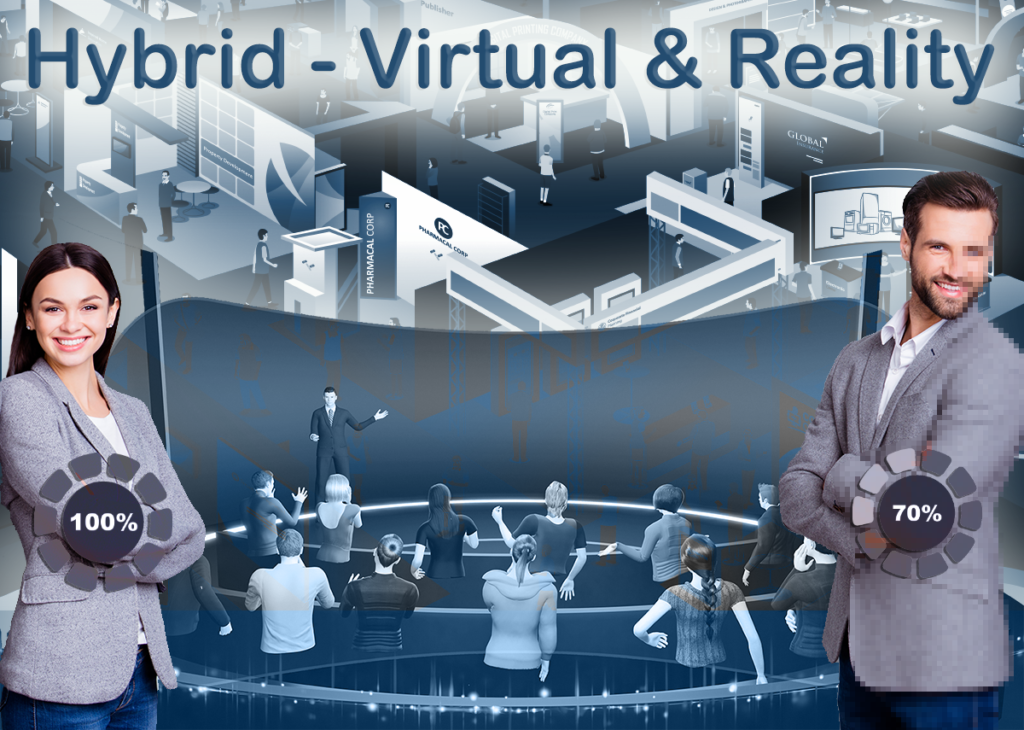
Hybrid trade fairs: The planning and organization of hybrid trade fairs (virtual & reality) – Image: Xpert.Digital
Trade shows are a traditional marketing strategy used by companies to showcase their latest products and connect with other companies, customers and potential partners in the industry. By participating in event marketing formats such as trade fairs, many companies want to increase awareness of their brand and promote sales. Other common marketing goals include driving customer loyalty, improving product knowledge, and introducing new products. Although trade shows and other in-person promotional events have faced strong competition from digital marketing channels in recent years, they remain among the most profitable business-to-business (B2B) media strategies around the world. In 2019, the global B2B trade fair market was valued at $34.4 billion, and by 2023 this number is expected to exceed 40 billion.
More about it here:
Hybrid trade fairs & smart fairs/events: The type and execution of trade fairs are changing
The trade fair industry has been changing since the Corona pandemic. More and more companies are realizing that the financial effort often does not lead to the desired results. No wonder, as a trade fair appearance involves high set-up and stand costs, while the staff present at the trade fair works exclusively for the event for days or even weeks and cannot be used for more lucrative projects. In addition, the effect is limited to the event and disappears again when it ends.
More about it here:
The trade fair of the future: hybrid model of success - global events in the metaverse and on site
Hybrid trade fairs and metaverse: The synergy for cross-border events
In recent years, the concept of trade fairs has continued to evolve to meet the changing needs and requirements of the global business world. One of the most exciting developments in this area is the hybrid trade fair, which combines the best of two worlds - the physical presence on site and the digital world of the metaverse.
Hybrid trade fair with metaverse and physical trade fair: An innovative trade fair experience of the future
The Metaverse is a virtual space detached from reality that allows people to move around in an immersive, 3D-like environment using avatars. This technology has gained enormous importance in recent years and is considered the future of the Internet.
How does a hybrid trade fair with metaverse and physical trade fair work?
1. Virtual access to global audiences
The integration of a metaverse into a hybrid trade fair gives exhibitors and visitors the opportunity to act globally and across borders. Participants from all over the world can take part in the trade fair without taking into account physical distance or travel restrictions. This means companies can showcase their products and services to a much wider audience, vastly expanding the potential for new business contacts and partnerships.
2. Immersive trade fair experience
The Metaverse enables a more immersive trade fair experience than traditional web conferencing platforms. Visitors can stroll through the exhibition halls with their avatars, visit virtual stands, view products in 3D and interact with the exhibitors. This creates an interactive and realistic experience that engages visitors more deeply in the trade fair and increases attention spans.
3. Flexibility and adaptability
A hybrid trade fair with metaverse and physical trade fair offers exhibitors more flexibility. Companies can choose whether they want to be present only in virtual space, only on site or in both areas. This allows participants to adapt their trade fair participation to their individual needs and budgets. In addition, content and presentations can be streamed in real time and later made available as on-demand content, allowing interested parties from different time zones to participate.
4. Cost effectiveness
The hybrid trade fair can reduce costs compared to a purely physical trade fair. Companies save travel and accommodation costs for their employees because many meetings and business contacts can take place virtually. At the same time, virtual presence allows content and presentations to be reused for other events or marketing purposes.
5. Environmental friendliness
A hybrid trade fair also helps reduce the environmental footprint as fewer physical resources and emissions are used through travel and logistics. This makes trade fair participation more environmentally friendly and shows a sustainable company commitment.
6. Safety and Health
The combination of physical trade show and Metaverse allows attendees to experience the trade show in a way that addresses their health and safety concerns. Particularly in times of health crises or unforeseen events that could restrict travel, the virtual component offers a suitable alternative to maintaining trade fair operations.
Outlook
The hybrid trade fair with metaverse and physical trade fair promises an exciting future for global, cross-border events. It offers companies the opportunity to expand their reach and create an immersive experience for participants while reducing costs and being more environmentally friendly. The combination of physical and virtual presence opens up new possibilities and opportunities that can surpass traditional trade fair experiences and lead the business world into an exciting new era.
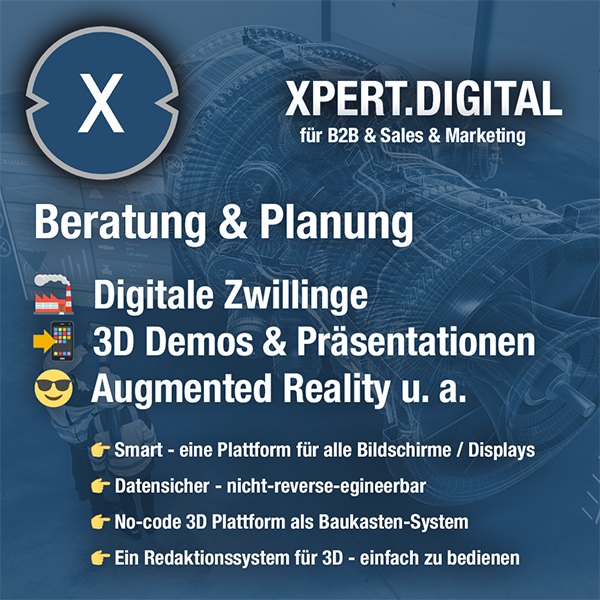
Xpert.Digital – Pioneer Business Development
If you have any questions, further information or need advice on the topic of Consumer Metaverse or Metaverse in general, please feel free to contact me at any time.
I would be happy to serve as your personal advisor.
You can contact me by filling out the contact form below or simply call me on +49 89 89 674 804 (Munich) .
I'm looking forward to our joint project.
Xpert.Digital – Konrad Wolfenstein
Xpert.Digital is a hub for industry with a focus on digitalization, mechanical engineering, logistics/intralogistics and photovoltaics.
With our 360° business development solution, we support well-known companies from new business to after sales.
Market intelligence, smarketing, marketing automation, content development, PR, mail campaigns, personalized social media and lead nurturing are part of our digital tools.
You can find out more at: www.xpert.digital – www.xpert.solar – www.xpert.plus



